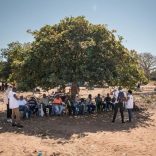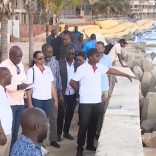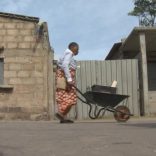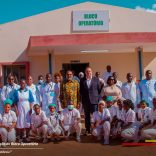As MSF activities come to an end in Nampula: Five facts about our work on neglected diseases in ...
Mozambique: Refugee, asylum seeker numbers fall 51% in last six years – government

FILE - For illustration purposes only. [File photo: DW ]
The number of refugees seeking asylum in Mozambique has reduced by 51% in the last six years, the director-general of the national institute for refugee support announced on Monday.
“Mozambique is no longer a country of preference for refugees or asylum seekers, as was the case six years ago,” Cremildo Abreu told Lusa on the sidelines of a press conference called by the United Nations High Commissioner for Refugees (UNHCR) as part of World Refugee Day, to be held on Tuesday.
In total, the country currently has 28,000 refugees and asylum seekers, of which at least 7,000 are in Maratane, the only refugee camp in the country, located in the northern province of Nampula.
Most of the people seeking refuge and safety in the country come from the Great Lakes region and the Horn of Africa, especially the Democratic Republic of Congo, Burundi, Rwanda and Somalia.
For the director of the national institute for refugee support, the reduction in the number of people seeking refuge in Mozambique is the result of several reasons, among which stands out the increase of refugees asking to be repatriated.
“A large number of refugees from Maratane centre have voluntarily asked to return to their country of origin and we are responding to these requests in coordination with UNHCR”, said Cremildo Abreu.
With the reduction, he continued, is born the need for a review of the system used to receive refugees by the government, as a way to update it to the new reality.
“These new dynamics also lead us to ponder on the sustainability of the Maratane centre,” added the director-general of the national institute for refugee support.
Despite the reduction in numbers, the UNHCR representative in Mozambique, Samuel Chakwera, highlighted a “favourable protection environment” for refugees in Mozambique.
“Almost all refugees or asylum seekers have a document that identifies them and this allows them to move around at will,” Samuel Chakwera noted.
Asked about the situation of IDPs (internally displaced people) due to the armed violence in Cabo Delgado, the UNHCR representative stressed that shelter remains the priority.
“We continue to work with partners in areas such as shelter and management of the centres. Our main activity in Cabo Delgado is linked to the protection of people,” Samuel Chakwera added, without giving further details.
Cabo Delgado province has been facing an armed insurgency for five years with some attacks claimed by the extremist group Islamic State.
The insurgency has led to a military response since July 2021 with support from Rwanda and the Southern African Development Community (SADC), liberating districts near gas projects, but new waves of attacks have emerged south of the region and in neighbouring Nampula province.
The conflict has left one million people displaced, according to the United Nations, and about 4,000 dead, according to the ACLED conflict registration project.












Leave a Reply
Be the First to Comment!
You must be logged in to post a comment.
You must be logged in to post a comment.